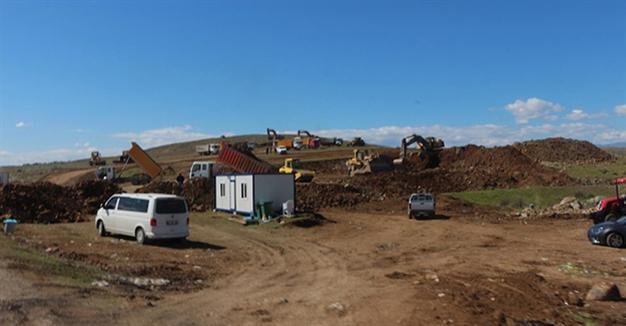Expert report advises against refugee camp in Turkey’s Maraş
İsmail Saymaz – KAHRAMANMARAŞ

Three experts charged with assessing plans to build a container city for around 27,000 Syrian refugees near predominantly Alevi populated villages in the southern province of Kahramanmaraş have all advised against the construction of a camp.
The report was prepared as part of a trial opened to annul a decision by the Kahramanmaraş Governor’s Office to assign a meadow, currently part of the village of Sivricehöyük in Kahramanmaraş’s Dulkadiroğlu district, for the construction of a refugee camp.
The Fourth Civil Court of First Instance in Kahramanmaraş conducted studies in the area and two experts prepared reports considering the issue from agricultural and geological perspectives. Another academic from the urban planning department of Dicle University in the southeastern province of Diyarbakır prepared a separate report on the camp from a city-planning perspective.
Professor Rüştü Hatipoğlu, who prepared the agricultural report, said it was questionable whether the move is in the public’s interest, as the meadow where the camp is planned is currently used to feed the villagers’ animals. There are 119 farmers and 30 cattle in the village, the report stated, explaining that even the meadow earmarked for the camp falls short in providing the annual fodder need of 547 tons. It currently provides almost 16 percent of this need, which would be exacerbated by the building of the camp.
The geological report, meanwhile, warned against a reduction of groundwater levels during efforts to meet the drinking water needs of the camp’s future residents. It also said an uncontrolled disposal of waste to the Karaçay stream would lead to pollution.
Finally, an academic and urban planner from Dicle University’s Faculty of Architecture, Dr. Mustafa Oğuz Sinemillioğlu, also advised against the container camp and criticized the selection of a rural area with “no perspective of production,” rather than a site nearer a large city.
The designated site is not appropriate to build a refugee camp considering the principles of urban planning and the public interest, Sinemillioğlu also said, stressing that the issue could have been resolved through the construction of integrated residences near or around large cities, which would afford more employment potential.
The report added that the local population was uncomfortable with the decision by the Governor’s Office, emphasizing that “social harmony and the social fabric” were ignored throughout the decision-making process.
The construction of the camp has drawn widespread resistance from locals, who are fearful of a rekindling of ethno-religious tensions with the potential arrival of extremists to a historically-sensitive region that is home to 24 predominantly Alevi villages.
“Alevis and Sunnis have learned to leave together peacefully in Maraş. We all must avoid actions that might threaten this peace,” the Alevi Cultural Association’s provincial head İbrahim İnçoğlu told reporters during the early phases of protests in April.
“We are not against refugees. We are just afraid that ISIL and al-Nusra militants will infiltrate into camps and harm the Alevis in this region,” İnçoğlu added.
Through 1978 and 1980, ahead of the Sept. 12, 1980 military coup d’état, Alevis were subjected to mass killings not only in Kahramanmaraş, then called Maraş, but also in Sivas and Çorum by ultra-nationalist groups.
 Three experts charged with assessing plans to build a container city for around 27,000 Syrian refugees near predominantly Alevi populated villages in the southern province of Kahramanmaraş have all advised against the construction of a camp.
Three experts charged with assessing plans to build a container city for around 27,000 Syrian refugees near predominantly Alevi populated villages in the southern province of Kahramanmaraş have all advised against the construction of a camp.